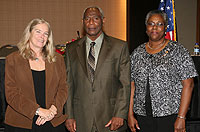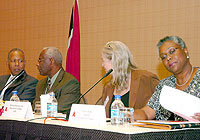
Feature Story
No room for complacency in the Caribbean challenge to HIV
29 October 2008
29 October 2008 29 October 2008
(from left) Michele Moloney-Kitts, Assistant Global AIDS Coordinator, US Department of State: Dr Roy Austin, US Ambassador to Trinidad and Tobago; Dr Karen Sealey, Director, UNAIDS Caribbean Regional Support Team. Credit: Shirley Bahadur
Despite successes in the Caribbean AIDS response, every day in the region 38 people lose their lives to AIDS and 55 become infected with HIV. This was the sobering message delivered by Dr Karen Sealey, UNAIDS Director of the Caribbean Regional Support Team, at the opening of the 7th Annual US Chiefs of Mission Conference on HIV/AIDS in the Caribbean held in Port of Spain, Trinidad and Tobago.
The annual high-level gathering which ran from October 22-23 was organized by the US Embassy in Trinidad and Tobago, in collaboration with USAID and Centers for Disease Control. Ambassadors from the Bahamas, Barbados, Belize, the Dominican Republic, Guyana, Jamaica, Suriname and Trinidad and Tobago attended. Haiti was also represented.
There were myriad challenges to draw their focus. In the region the epidemic is increasingly affecting young women. Disproportionately affected too are people who practice certain behaviours including men who have sex with men, people who buy and sell sex, crack cocaine users and prisoners. Stigma is rife throughout the small island nations of the region and discrimination based on differences in sexual orientation is fuelling the epidemic. Following the recent decriminalization of homosexuality in Panama, the seven countries in the Americas where homosexuality is still effectively a crime are all in the Caribbean.
HIV treatment and prevention

(from left) Patrick Manning, Prime Minister of Trinidad and Tobago; Dr Roy Austin, US Ambassador to Trinidad and Tobago; Michele Moloney-Kitts, Assistant Global AIDS Coordinator, US Department of State; Dr Karen Sealey, Director, UNAIDS Caribbean Regional Support Team. Credit: Trinidad Express
There has, however, been significant momentum in several areas including treatment. In 2003 4000 people were receiving antiretroviral therapy, by the end of 2007 that figure had increased to 30,000.
According to Patrick Manning, the Prime Minister of Trinidad and Tobago who addressed the conference, his country shares in this notable success: “There has been a 50% reduction in reported deaths. Some people have been able to return to relatively normal lives due to treatment from antiretroviral drugs.” He also stressed that complacency remained a clear danger.
Treatment success however has not been matched by prevention success across the region. For every 50 people put on antiretroviral therapy in 2007, there were 100 new infections.
US President’s Emergency Plan for AIDS Relief
One of the main areas for discussion was the second phase of the US President’s Emergency Plan for AIDS Relief (PEPFAR) and how the Caribbean could spearhead implementation. In July President Bush signed the reauthorization of PEPFAR to the tune of US$ 39 billion for AIDS and the Global Fund over the next five years. Haiti and Guyana have been recipients to date however other countries in the Caribbean are set to receive support from this new PEPFAR allocation. Although details of how the region will benefit have not been decided, UNAIDS is committed to helping ensure that this is maximized by working hand in hand with partners in Washington DC and in the region, such as the Pan Caribbean Partnership against HIV/AIDS (PANCAP).
The conference expanded the knowledge base of the US Ambassadors in the Caribbean and encouraged them to use their leadership role to highlight the epidemic and better support their host country’s challenge to it. In the past this gathering has helped to give the Ambassadors a powerful advocacy voice in the region.
Keeping HIV high on the agenda
Looking ahead to 2009, UNAIDS Regional Director Dr Sealey called for AIDS to be kept on the highest political agenda. The Government of Trinidad and Tobago will host three significant gatherings in the coming year; the Summit of the Americas, the First Caribbean Games and the Commonwealth Heads of Government Meeting which present potential opportunities to create new regional momentum in the challenge to HIV.
No room for complacency in the Caribbean challeng
Partners:
US President’s Emergency Plan for AIDS Relief (PEPFAR)
Pan Caribbean Partnership against HIV/AIDS (PANCAP)
Feature stories:
Leaders pledge to promote sexual health to stop HIV in Latin America and the Caribbean (03 August 2008)
Caribbean faith leaders respond to AIDS
Speeches:
Address by Dr Karen Sealey, Director, Caribbean Regional Support Team, UNAIDS



